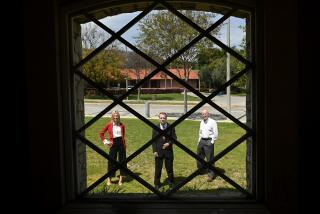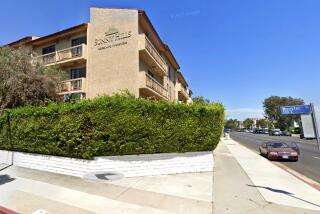L.A. sues Koreatown developer, saying he stiffed the city $220,000 in legal bills
Los Angeles City Atty. Mike Feuer has filed a breach-of-contract lawsuit against the developer of a proposed Koreatown residential tower, saying he owes the city more than $220,000 for legal bills racked up during a court battle over his project.
In a lawsuit filed last week, Feuer’s legal team said developer Michael Hakim and his company, Colony Holdings, failed to comply with agreements requiring them to reimburse the city for costs incurred during a legal challenge over the 27-story tower project.
The City Council approved Hakim’s 269-unit apartment tower in 2015, despite opposition from planning department staffers and Mayor Eric Garcetti’s appointees on the planning commission. A judge struck down the approval of the project three years later, saying the city had not properly examined the project’s impact on traffic, public safety and other issues.
The project was never built. In an interview, Hakim said he had not yet seen the city’s lawsuit.
“I have to look into it,” he said. “You know when you buy something in the store, or online ... that has that small, little fine print? The city probably put that in the conditions of approval.”
The lawsuit comes a few weeks after The Times reported that council President Herb Wesson helped Hakim win approval of the Koreatown tower while his son, Herb Wesson III, was living in an apartment building owned by a company where Hakim is listed as an executive.
Three people who lived in the apartment building during the last decade told The Times they were aware that the younger Wesson was receiving a rent break — and that it was provided because his father is a councilman. Two of them said Wesson III told them about receiving a discount.
After The Times published its findings, a spokeswoman for Dist. Atty. Jackie Lacey said the D.A.’s office would review questions surrounding the apartment.
A Wesson spokesman said previously that the council president does not arrange rental agreements for his adult children and called The Times’ reporting on the apartment “a political hit piece full of insinuations.” Hakim said previously that he became aware of Wesson III when he was contacted by The Times about the apartment.
Hakim, a first-time developer, scored big with his project in 2015, persuading Wesson and his colleagues to rezone his property so that it would allow twice as many apartments as the city’s planning rules allowed at the time.
In the months leading up to the council’s vote, one planning commissioner warned that it would be “illegal” for the city to approve the project. Neighborhood activists also opposed the project, saying they feared it would spur other landlords to hike rents and push out low-income families.
Wesson III moved in 2011 into an apartment on Rosewood Avenue owned by Rosewood Corp., which identified Hakim as its chief financial officer in state business filings. Hakim also signed a declaration in 2017 saying he was the owner of the 20-unit building, according to a permit application filed with the city’s Department of Building and Safety.
The apartment where Wesson III lived was spared rent hikes for more than five years, even as most other eligible units received increases, according a Times analysis of city rent records. Several tenants told The Times they received multiple rent hikes while living in the building.
Wesson III moved into a different apartment in the same building last year. He would not say how much his rent was during the period when his father reviewed and approved Hakim’s project. In an email, he attributed the controversy to his father’s political opponents.
The council cast its final vote approving Hakim’s project in 2016. That same year, the city required that Hakim and Colony Holdings “indemnify, defend, hold harmless and reimburse the city” for legal fees incurred while defending the project in court.
Three groups sued to overturn the city’s decision. After Hakim’s project was struck down, a judge awarded one of those groups $210,779 in legal fees and costs.
The city paid the group, known as Fix the City, for those costs this year, according to the lawsuit. Since then, the city’s lawyers have demanded that either Hakim or Colony Holdings provide reimbursement.
“Defendants Colony Holdings or Hakim have refused,” the lawsuit states.
Hakim and Colony Holdings also owe the city nearly $10,000 for work performed by one of the city’s law firms, the lawsuit said.
More to Read
Start your day right
Sign up for Essential California for news, features and recommendations from the L.A. Times and beyond in your inbox six days a week.
You may occasionally receive promotional content from the Los Angeles Times.








